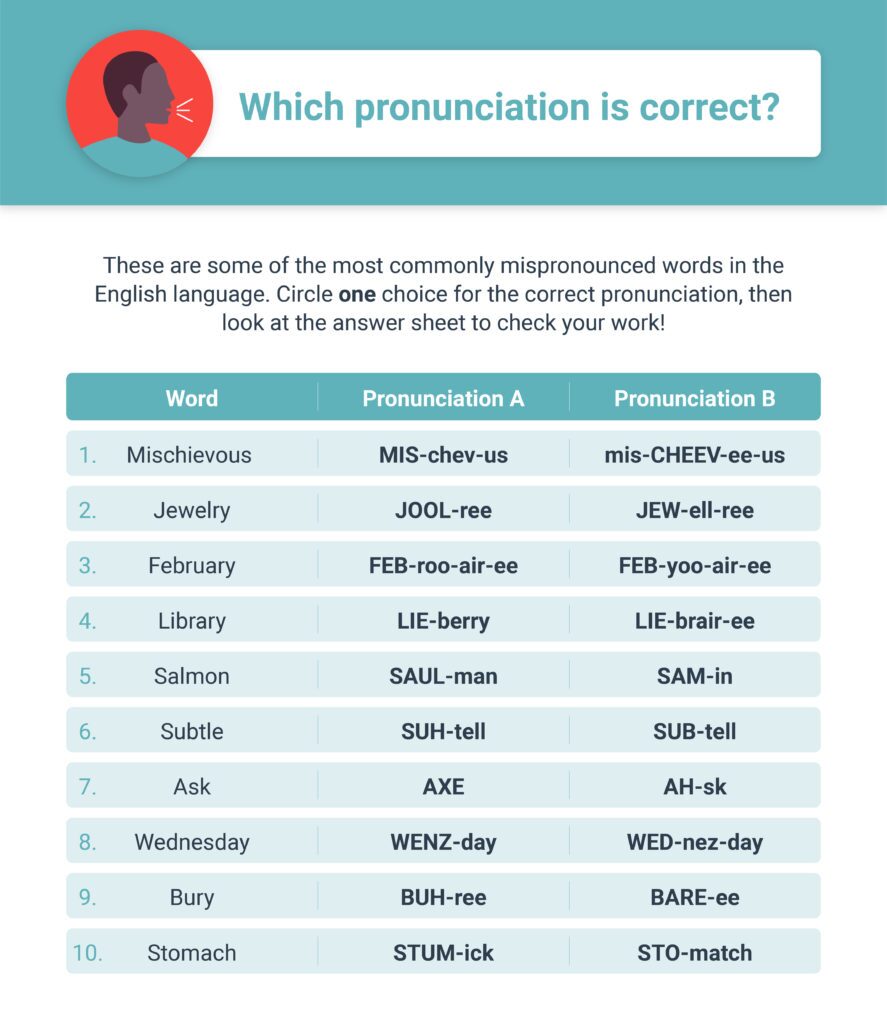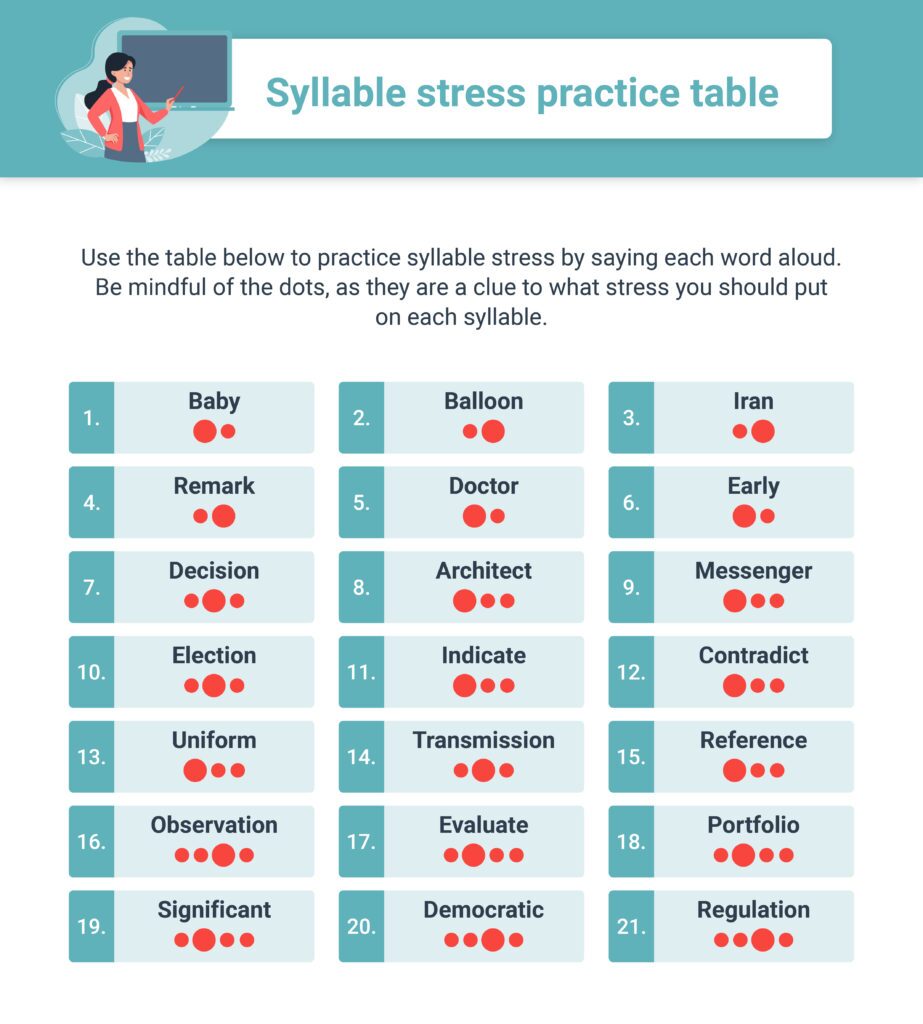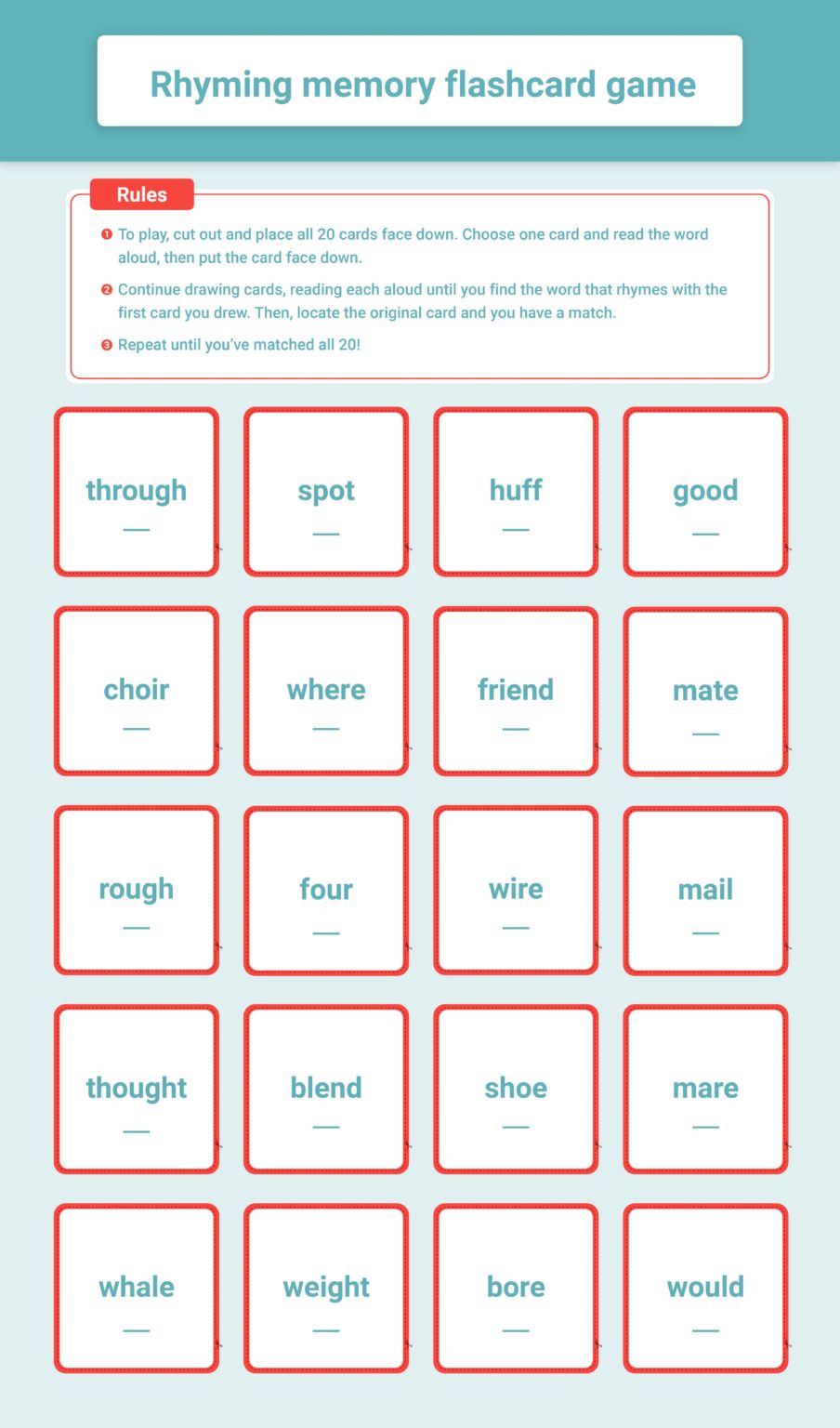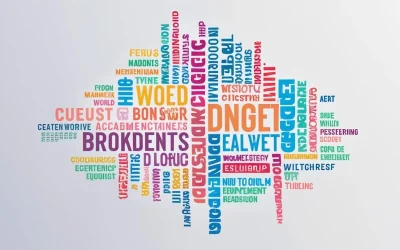Enhancing your English pronunciation skills may pose a difficulty when acquiring a new language, but our exercises and printable resources are designed to inject an element of enjoyment into the practice!
Whether you aim to refine your English accent or require assistance with the more challenging aspects of English pronunciation, our straightforward exercises and interactive printable resources are here to aid you in sounding closer to a native speaker and enhancing your pronunciation abilities quickly.
1. Tongue twister exercises
Tongue twisters can be challenging, but they provide a valuable exercise for articulating words with similar sounds to make each phrase clear.
For instance, a phrase like “Peter Piper” can assist in refining the pronunciation of consonants, particularly “P.” Similarly, “A Proper Cup of Coffee” places emphasis on both “P” and “F” sounds while incorporating a range of vowel sounds.
It’s not necessary to begin at a fast pace. Instead, take it slowly during your initial attempts, and then gradually increase your speed. Follow along and practice at your own pace.
Peter Piper
Peter Piper picked a peck of pickled peppers
A peck of pickled peppers Peter Piper picked
What is your English level?
Find out your A1 A2 B1 B2 C1 C2 level of English with our online test and receive your English certificate.
Proper Copper Coffee Pot
All I want is a proper cup of coffee.
Made in a proper copper coffee pot.
You can believe it or not.
But I want a cup of coffee from a proper copper pot.
Tin coffee pots or iron coffee pots, they’re not good to me.
If I can’t have a proper cup of coffee from a proper copper coffee pot, I’ll just have tea.
All I want is a proper cup of coffee.
Made in a proper copper coffee pot.
You can believe it or not.
But I want a cup of coffee from a proper copper pot.
2. Consonant exercise
Consonants are speech sounds formed when the flow of air is obstructed within the mouth. They are produced by either closing the lips or by the tongue making contact with the teeth or the roof of the mouth.
ESL learners often encounter challenges when mastering certain consonants, such as ‘p,’ ‘t,’ and ‘k,’ which are sounds not present in all languages. Complicating matters further, specific consonant combinations like ‘ch,’ ‘sh,’ and ‘th’ produce unique sounds.
The International Phonetic Alphabet (IPA), more commonly utilized in Europe than in America, was developed in the late 19th century with the aim of standardizing how spoken language was represented in written form. Learning the International Phonetic Alphabet has proven to be beneficial in mastering these more intricate pronunciations, which is why it is incorporated into ESL classes.
Consonant board game
Our downloadable board game for consonants is designed for 2 or more players and necessitates the use of a single die, as well as markers like coins or buttons for each participant. During a player’s turn, they roll the die and move their game piece forward the number of spaces corresponding to the roll.
In this game, the player’s task is to first articulate the consonant blend indicated by their position on the board and then produce a word that incorporates that particular blend. For instance, if a player lands on ‘d,’ they would pronounce the sound “d” and subsequently cite a word like “dog” as an example. The first player to successfully navigate the board and reach the end emerges as the winner.

3. Vowel exercise
Vowels are sounds produced when air flows through the mouth without any obstruction from the tongue, teeth, or lips. Vowels come in various forms, including “long” and “short” sounds. Occasionally, vowels are entirely silent, as seen in the “ue” of “tongue.”
When vowels are combined, they can add complexity, such as the double “o” in “cool,” which sounds like a long “u,” or the “ei” in “vein,” which creates a long “a” sound resembling “lay” and “plane.”
To help ESL students distinguish among the numerous English vowel sounds and learn to articulate them correctly, it’s beneficial to engage in sound repetition exercises. These exercises often begin with the fundamental long sounds of the five vowels.
Our morning vowel warm-up exercise can be undertaken by individuals or in a classroom setting. In a group setting, you can instruct students to collectively, in pairs, or individually practice each vowel sound. The duration of this exercise can be adjusted to suit your lesson’s needs, and it can be a quick and simple way to kickstart your class.
Morning vowel warm-up
Select a suitable time during your day and allocate 5-10 minutes for practicing your vowel sounds while standing in front of a mirror. As you observe yourself in the mirror, pay attention to the shape of your mouth and the formations you create when articulating each vowel sound. This exercise might appear a bit amusing, but it serves the purpose of elongating each vowel sound and enabling you to concentrate on the phonetic sound associated with each of the letters: A, E, I, O, and U.
- A as in ape
- E as in easy
- I as in eye
- O as in over
- U as in usually
As you gain confidence with the sounds, intensify your practice using this exercise. Accelerate the pace at which you cycle through the vowels and reduce the duration for which you hold each sound.
4. Commonly mispronounced words exercise
Even native English speakers can find similar sounds confusing. For example, many individuals say or write “should of” and “could of” instead of “should have” and “could have.” In some instances, syllables or consonants are omitted, leading to words like “probly” instead of “probably” or “pitcher” instead of “picture.”
It’s a common mistake to add an “s” to the end of “anyway” or mix up “accept” with “except.” Improving your command of words that are frequently mispronounced, even by native speakers, can be beneficial for pronunciation and speaking practice.
Mispronounced words worksheet
Our downloadable worksheet aids ESL students in honing their pronunciation skills by prompting them to select the correct pronunciation from options for commonly mispronounced words.

5. Homograph exercise
Homographs are words that share the same spelling but have distinct meanings and, at times, different pronunciations. For example, you can “bow” before royalty (pronounced with an “ow” sound) or use a “bow” (pronounced with an “oh” sound) to shoot an arrow. An “entrance,” with the stress on the first syllable, is a noun referring to a way in, while “to entrance,” with the stress on the second syllable, is a verb meaning to captivate or delight.
It’s important not to confuse homographs with homophones, which are words that sound alike but have different meanings, like “two,” “to,” and “too.” Additionally, there are homonyms, which are words that share the same pronunciation with another word but carry distinct meanings. An example of a homonym is “spring,” which can refer to a coiled piece of metal, a season, a water source, or the act of shooting forth.
.
Pancake Panic online game
At times, uncomplicated games prove to be the most effective method for solidifying a concept. “Pancake Panic” enables participants to pair homographs and homophones or rely on their memory to construct a stack of pancakes (matching) or flip pancakes to unveil various words (memory).
Here are several typical homographs and homophones that students can practice prior to engaging in a game of “Pancake Panic.”
- bear and bare
- ad and add
- peace and piece
- stair and stare
- close and close
6. Similar words pronunciation exercise
English contains numerous homophones, posing a challenge for language learners. Words that share similar sounds can be perplexing, even for native speakers, who may mix up “their,” “they’re,” or “there” in their writing.
Practice is beneficial for English learners to distinguish between various spellings and meanings for words like “shoot” and “chute” or “colonel” and “kernel.” It also aids in highlighting subtle distinctions between words such as “accept” and “except” or “boy” and “buoy.”
Minimal pairs game
This game aids in enhancing your ability to recognize spoken English and can be enjoyed individually or with a partner.
In the partner version, your partner reads a word from the worksheet, and you circle or mark the word that you hear. Afterward, you compare your response with what your partner read.
If you’re playing alone, read each word aloud and be attentive to the variations in pronunciation. Speak slowly and articulate each syllable.
What is your English level?
Find out your A1 A2 B1 B2 C1 C2 level of English with our online test and receive your English certificate.

7. Syllable stress exercise
This game aids in enhancing your ability to recognize spoken English and can be enjoyed individually or with a partner.
In the partner version, your partner reads a word from the worksheet, and you circle or mark the word that you hear. Afterward, you compare your response with what your partner read.
If you’re playing alone, read each word aloud and be attentive to the variations in pronunciation. Speak slowly and articulate each syllable.
Syllable stress practice table
This game aids in enhancing your ability to recognize spoken English and can be enjoyed individually or with a partner.
In the partner version, your partner reads a word from the worksheet, and you circle or mark the word that you hear. Afterward, you compare your response with what your partner read.
If you’re playing alone, read each word aloud and be attentive to the variations in pronunciation. Speak slowly and articulate each syllable.

8. Reduced sounds exercise
This game aids in enhancing your ability to recognize spoken English and can be enjoyed individually or with a partner.
In the partner version, your partner reads a word from the worksheet, and you circle or mark the word that you hear. Afterward, you compare your response with what your partner read.
If you’re playing alone, read each word aloud and be attentive to the variations in pronunciation. Speak slowly and articulate each syllable.
Schwa Song
The Schwa Song is an enjoyable method for introducing individuals to the application of the schwa sound in spoken language. It offers examples of the “uh” sound found in words like “about,” “around,” “pizza,” and “sofa,” which aids in acquainting singers with the schwa in everyday language.
(To the tune of “The Wheels on the Bus”)
The Schwa sound is in pizza and sofa,
Pizza and sofa,
Pizza and sofa,
The Schwa sound is in pizza and sofa,
Do you hear an uh?
9. Rhyming exercise
Rhyming exercises and games can assist English learners in getting acquainted with the similar sounds found in various words. Repeating these words and sounds can enhance their fluency and make them sound more natural with consistent practice.
Rhyming memory flashcard game
Using flashcards can strengthen one’s understanding of word usage and pronunciation through repetitive practice. Memory games enhance visual recognition, aiding learners in identifying details and differences, thus fostering greater familiarity with language distinctions. Flashcards can also contribute to improving your reading skills in English.

10. Shadow speaking exercise
Shadow speaking is a language learning technique that involves promptly repeating what someone says. It is often utilized with audio recordings to facilitate language acquisition. The recordings typically feature common words and phrases for the listener to mimic, aiding in the mastery of challenging pronunciations.
An effective way for students to practice shadow speaking is by playing the telephone game, a common childhood activity. In this game, one person whispers a message to the next person, who then repeats it and passes it on. For online learning, our interpreter exercise is a useful tool for developing this skill.
Interpreter exercise
You can practice shadow speaking through interpretation exercises. In these exercises, one person explains something or narrates a story, while their partner restates and repeats what was said. For instance:
- Speaker: “To make toast, you need to make sure the toaster is plugged in and then grab whatever you want to toast, such as bread or a bagel.”
- Interpreter: “Before you can make toast, check to see if the toaster is plugged in, then get bread.”
- Speaker: “Check the dial to make sure the toaster is on the setting you prefer and then put the bread into the slots on the toaster.”
- Interpreter: “Adjust the toaster’s setting and then put the bread in.”
The aim of this exercise is to instruct English learners on how to comprehend spoken language and restate it using their vocabulary. The speaker’s objective is to speak slowly and clearly, providing precise instructions to the interpreter. The interpreter should concentrate on conveying the most accurate version of the story or instructions to the rest of the class based on what they hear.
General tips to improve English pronunciation
Improving your English pronunciation doesn’t necessarily require structured exercises. There are plenty of opportunities to practice by observing how English is spoken in real-life situations. Here are a few examples.
Sing songs in English
Music is a universal language, making songs a valuable tool for English learners to become acquainted with vocabulary and pronunciation. Consider singing songs like the Jackson 5’s “ABC” to practice letter and number pronunciation, or The Cure’s “Friday I’m in Love” to learn the days of the week. “My Favorite Things” from The Sound of Music includes rhyming phrases, consonant sound alliteration, and an introduction to new vocabulary. Furthermore, numerous songs feature rhymes that can aid in making word pronunciations more recognizable. Don’t overlook children’s songs as they can be highly beneficial as well.
Find a native speaker for weekly chats
native English-speaking friend can be a valuable resource in your journey to learn English. Alternatively, if you don’t have such a friend, you might consider hiring an ESL tutor to aid in your practice. Request to engage in shadow speaking with your friend or tutor, and don’t hesitate to seek assistance with challenging words or phrases. Ask for feedback on your progress and inquire about areas where they believe you need further improvement. With time, your friend or tutor can observe your learning and provide valuable insights into enhancing your English conversational abilities.
Speak slowly
Sounding out words syllable by syllable, as children do when learning to read, can be a beneficial exercise for English learners. This approach not only enhances pronunciation but also fosters the habit of speaking more clearly during conversations. Slowing down your speech makes it easier for others to understand you, regardless of whether English is a new language for you or your native tongue.
Read out loud and record yourself
Recite sentences and phrases out loud, and make audio recordings of yourself. Upon listening to the recordings, you can assess how you sound to others. By comparing your pronunciation to that of native speakers, you can identify both similarities and differences. This will enable you to focus on adjusting your speech in areas where differences exist and can also aid in improving your grasp of English grammar.
Watch movies and TV shows in English
Television programs and movies serve as additional resources for observing how people communicate. You can enhance your listening skills and endeavor to replicate the speech you encounter on the screen. It’s important to note that you may come across various accents, such as a New York or Southern accent.
If you happen to reside in an area with distinctive accents, consider watching shows featuring those accents to practice speaking like the locals.
In today’s digital age, you have access to various online resources, including news websites, music platforms, and websites that offer word games to support your English learning journey. These resources can be accessed on your computer or by downloading mobile apps.
Conclusion
Mastering a new language is consistently a demanding endeavor, and English is renowned for its complexity. However, it is a valuable skill to acquire. English is not only one of the numerous languages spoken in the United States and around the world but is also the most widely spoken. Individuals seeking to acquire English as a second language have a multitude of avenues for refining their proficiency, including online tools and ESL tutors.
Whether you’re engaging in activities like singing, watching films, conversing with a native-speaking friend, or engaging in structured exercises, you can attain fluency in English and excel in pronunciation, allowing you to seamlessly integrate into any environment.
Are you C1 Advanced English?
Get your C1 Advanced English certificate now!
✓ Add your certificate to your resume
⭐ ⭐ ⭐ ⭐ ⭐
I am Nilay, an experienced English Language Assessment Director at the International English Test, where I have been working full-time since February 2020. I specialize in helping people worldwide validate their English proficiency through comprehensive assessments and certifications.
Before joining the International English Test, I worked as a self-employed English Language Assessment Consultant from January 2015 to December 2019. During this time, I assisted companies and individuals in improving their language skills, helping them achieve their academic and professional goals.
I hold a degree in Engineering and have also studied at Shafston International College in Australia. My educational background has equipped me with the tools to make a meaningful impact in the field of English language learning. Additionally, I enjoy sharing my expertise through articles that explore effective teaching methods and language assessment strategies, contributing to the International English Test and the broader assessment community.





